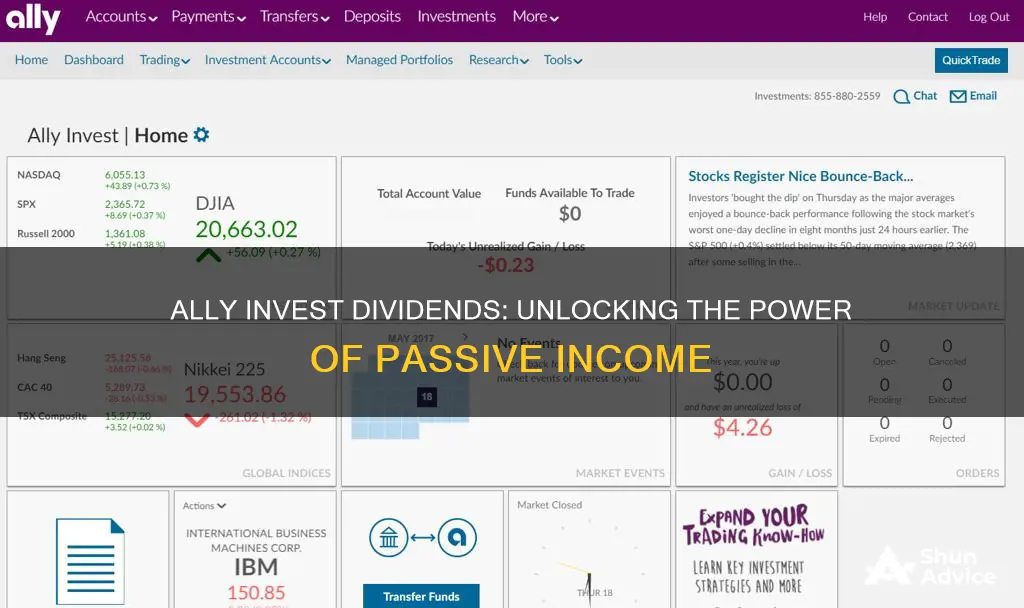
Dividends are a way to generate an investment income stream. Ally Invest offers free automatic dividend reinvestments (DRIPs) with the ability to purchase fractional shares. Investors can apply automatic DRIPs to all or select stocks in their portfolios. DRIP transactions can be tracked in real time on the Activity page and are also included in monthly or quarterly account statements.
| Characteristics | Values |
|---|---|
| Dividend Reinvestment Plan (DRIP) | Free program that allows cash dividends to be used to purchase additional shares |
| DRIP Eligibility | All marginable U.S. equities and selected American Depository Receipts (ADRs) priced at $4 or more |
| DRIP Transactions | Can be tracked online in real time on the Activity page and Maxit Tax Manager page |
| DRIP Statements | Included in monthly account statements |
| DRIP Enrollment | Free, can be done online from settings in Ally Invest Live |
| DRIP Enrollment Frequency | Once per day |
| DRIP Enrollment for Individual Stocks | Can be added or removed by calling 1-855-880-2559 |
| DRIP for Existing Customers | Stocks held in a dividend reinvestment program from another firm can be transferred to an Ally Invest account |
| DRIP for Partial Shares | Allowed |
What You'll Learn

Dividend Reinvestment (DRIP)
Ally Invest offers a free dividend reinvestment program (DRIP) that allows cash dividends to be automatically used to purchase additional whole or fractional shares of your investment. This enables shareholders to accumulate stock over the long term without paying commission fees. All marginable U.S. equities and selected American Depository Receipts (ADRs) priced at $4 or more are eligible for DRIP.
You can enrol in the dividend reinvestment program online from your settings in Ally Invest Live. You can also call 1-855-880-2559 to add or remove individual stocks. You can enrol or unenrol once per day.
DRIP transactions can be tracked in real time on your Activity page and the Maxit Tax Manager page. They will also appear in your monthly or quarterly account statements.
You can transfer stocks held in a dividend reinvestment program from another firm to your Ally Invest account. However, transferring stocks would terminate the other firm's DRIP, and partial shares would be liquidated during the transfer process and moved as cash.
Avoid These Investment Traps
You may want to see also

Dividend Aristocrats
To be classified as a Dividend Aristocrat, a company must meet certain requirements. Firstly, it must have at least 25 consecutive years of increasing dividend payments. Additionally, it must satisfy minimum size and liquidity requirements, as outlined by the S&P 500 Index. These criteria ensure that Dividend Aristocrats are not only consistent in their dividend payments but also possess a certain level of financial stability and market presence.
The Dividend Aristocrats list is a valuable resource for investors as it provides a concise list of high-quality, shareholder-friendly companies with strong competitive advantages. These companies have demonstrated their commitment to rewarding shareholders with consistent dividend payments, making them attractive for long-term investment strategies.
Ally Invest, a leading investment platform, offers tools and resources to help investors evaluate dividend stocks, including Dividend Aristocrats. Through Ally Invest, investors can access information on dividend history, dividend yield, dividend payout ratios, and dividend tax rates, enabling them to make informed investment decisions.
By enrolling in the Dividend Reinvestment Plan (DRIP) offered by Ally Invest, investors can automatically reinvest their cash dividends to purchase additional whole or fractional shares of their investments. This allows for the accumulation of stock over the long term without incurring commission fees, providing a convenient way to grow their holdings in Dividend Aristocrats and other dividend-paying stocks.
Small Investments, Big Returns
You may want to see also

Dividend yield
While a high dividend yield might be attractive to investors, it is important to approach such stocks with caution. A very high dividend yield could indicate an unsustainable payout or a declining stock price. Therefore, it is recommended to conduct thorough research and due diligence before investing in stocks with high dividend yields. A payout ratio above 80% is generally considered unsustainable in the long run, as it indicates that a significant portion of the company's earnings are being paid out to shareholders.
Ally Invest provides investors with access to dividend yield data, enabling them to make informed investment decisions. The platform also offers dividend reinvestment plans (DRIPs), which allow investors to automatically reinvest their cash dividends into purchasing additional whole or fractional shares of their investment. This helps investors accumulate more shares over time without incurring commission fees.
When considering dividend stocks, it is essential to evaluate the dividend history, dividend yield, dividend payout ratio, and dividend tax rate. Additionally, investors should be mindful of important dividend dates, such as the declaration date, ex-dividend date, record date, and payment date.
By understanding dividend yields and the factors that influence them, investors can make more informed decisions when investing in dividend stocks through platforms like Ally Invest.
Black People: Investing Fears
You may want to see also

Dividend payout ratio
The dividend payout ratio is a financial metric that shows the proportion of a company's earnings paid out to shareholders as dividends. It is calculated by dividing the total dividends paid out by the company's net income, and it is expressed as a percentage. For example, if a company reports a net income of $100,000 and issues $25,000 in dividends, the payout ratio is 25% ($25,000 / $100,000 = 0.25), and the retention ratio is 75%important metric for investors as it helps them determine which companies align with their investment goals. A high DPR means the company is reinvesting less money back into its business and instead distributing more of its earnings as dividends. These companies tend to attract income investors who prefer a steady income to potential growth in share price. On the other hand, a low DPR indicates that the company is reinvesting more money into expanding its business, which may generate higher capital gains for investors in the future. These companies tend to attract growth investors who are more interested in potential profits from a significant rise in share price.
It is important to note that there is no optimal dividend payout ratio, as it depends on the industry, nature of the business, maturity, and business plan of the company. Defensive industries such as utilities, pipelines, and telecommunications tend to have stable earnings and cash flows that can support high payout ratios. Income-driven investors typically look for a payout ratio of around 60%, with 35% to 55% also considered strong. In contrast, companies in cyclical industries tend to have less reliable payouts due to their vulnerability to macroeconomic fluctuations.
When evaluating a company's dividend payout ratio, investors should consider the company's age, maturity, industry, financial condition, and payout ratio history. A payout ratio of 100% or more is generally considered unsustainable, as it indicates that the company is paying out more in dividends than its earnings can support.
Why Private Equity is Worth the Risk
You may want to see also

Dividend tax rate
Dividends are considered income by the IRS and are usually taxable. The dividend tax rate varies depending on the type of dividend, your filing status, and your taxable income.
There are two types of dividends: qualified and non-qualified (also known as ordinary dividends). Qualified dividends are taxed at a lower rate than non-qualified dividends. The tax rate for qualified dividends is 0%, 15%, or 20%, depending on your taxable income and filing status. For example, for the 2023 tax year, single filers who earn more than $44,625 or married couples filing jointly who earn more than $89,250 will pay a 15% tax rate on qualified dividends. The tax rate for non-qualified dividends, on the other hand, can be as high as 37%.
It's important to note that you may need to pay taxes on dividends even if you reinvest them instead of receiving them as cash. Additionally, the length of time you hold your investments, the size of your dividends, and your overall income can impact the dividend tax rate you pay. Consulting a financial advisor or tax professional can help you understand the specific tax implications of dividends for your situation.
Mortgage Freedom or Investment Gains: Where Should Your Money Go?
You may want to see also
Frequently asked questions
The dividend reinvestment plan (DRIP) is a free program that allows cash dividends you receive to automatically be used to purchase additional whole or fractional shares of your investment. This lets shareholders accumulate stock over the long term without paying commission fees.
Dividend reinvestment is a free service.
Yes, you can transfer stocks held in a dividend reinvestment program from another firm to your Ally Invest account.
You can enroll in the dividend reinvestment program online from your settings in Ally Invest Live. You can also call 1-855-880-2559 to add or remove individual stocks.
Yes, you will be able to see dividend reinvestment (DRIP) transactions in real time on your Activity page. You can also view DRIP purchases on the Maxit Tax Manager page and in your monthly or quarterly account statements.







